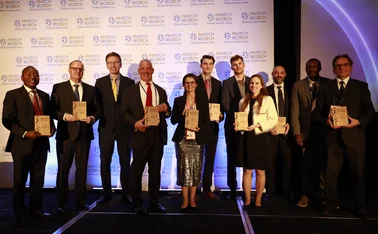
The winners of the 2024 FinTech & RegTech Global Awards
Seventh annual tech awards recognise excellence among central banks and the private sector


Central Banking unveiled the winners of its seventh annual FinTech & RegTech Global Awards today (November 13), recognising the technological achievements of central banks, supervisors and commercial tech providers
The 12 awards highlight official institutions’ success in tokenisation, quantum-proof resilience, sustainable finance, central bank digital currency (CBDC) ecosystem innovation, the use of artificial intelligence (AI) in regtech and suptech, and data automation to inform monetary policy. Firms were recognised for their use of AI and machine learning to fight money laundering and fraud, analytical services to support international regulatory compliance and a framework for regulators to simplify complex rules systems, as well as work developing quantum-proof offline CBDC technology and setting up a risk framework for AI in finance.
The press release is available here.
Central banks and supervisors
Experiments advancing global financial market infrastructure, and decentralised monetary and financial systems, are at a critical juncture. The Global Impact award went to the Swiss National Bank (SNB) in recognition of its pioneering live wholesale CBDC and monetary policy operations on distributed-ledger technology.
“The award underscores the significance of research and development efforts in wholesale CBDC, including the potential to carry out monetary policy operations,” Martin Schlegel, chairman of the governing board of the SNB, says. “Wholesale CBDC has the potential to strengthen our future financial system. However, it is essential to continue exploring its risks and challenges to ensure a comprehensive understanding of its implications for the financial system and its users.”
The Bank of Namibia won this year’s Pioneer Award. Its Automation Centre of Excellence revolutionised the institution’s operations, from data collection for monetary policy and stress-testing to automation of the Namibian government’s payments. The central bank’s digital technology stack was elevated to include AI and machine learning capabilities, notably to create a predictive model for non-performing loans, enhanced sanctions screening and trade verification, as well as Namibia’s first-ever automated regulatory reporting system.
“This award marks a proud moment for the Bank of Namibia and our journey towards digital transformation,” Johannes !Gawaxab, governor of the Bank of Namibia, says. “Our commitment to innovation has not only modernised our financial system but also laid the groundwork for greater financial inclusion and economic resilience.” He adds that the central bank “will continue to create a regulatory environment that fosters collaboration and encourages the adoption of new technologies”.
Climate change is causing global financial risk, the true extent of which is unknown. There are currently no global financial climate reporting standards, but central banks, supervisory authorities and financial institutions need higher-quality and more accessible data. To help solve this, the Bank for International Settlements (BIS), together with its partners the Bank of Spain, the Deutsche Bundesbank and the European Central Bank, created Project Gaia, which uses AI to unearth climate-related data buried in financial institutions’ corporate reports across several languages.
Head of the BIS Innovation Hub Cecilia Skingsley says: “Project Gaia demonstrates a use case for generative AI [GenAI] that improves the resilience of the financial system and contributes to the public good.”
Advances in quantum computing are set to accelerate over the next decade and trigger significant changes in the cyber threat landscape. The UK’s Financial Conduct Authority (FCA) and the World Economic Forum (WEF) have been recognised in the Cyber Resilience Initiative category for the first global effort to co-ordinate a transition to quantum security in the financial sector, bringing together experts from quantum computing technology providers, as well as financial services and regulatory authorities.
Jeremy Jurgens, managing director of the WEF, says the initiative “is a testament to the importance of public-private co-operation and international dialogues”, and the WEF looks forward to partnering with other sectors “to enable a secure transition to the quantum economy”.
“In an era where cyber security threats are evolving faster than ever, this research ensures we remain ahead of the curve, preparing for the challenges posed by quantum computing and its potential to disrupt conventional encryption methods,” adds Jessica Rusu, chief data information and innovation officer of the FCA.
The Bank of Portugal was recognised in the Artificial Intelligence Initiative category for its Alya platform, which automates and streamlines different operations, from banking supervision to answering complaints. The platform provides instant analysis of documents and data, using natural language, audio, image and speech processing. The Bank of Portugal has also combined Alya with Tia, the Bundesbank’s AI-powered text analysis tool, to launch ‘Tilya’, a prototype that allows users to interact with documents and validate banking supervision Pillar 3 requirements.
Commenting on the award, Mário Centeno, governor of the Bank of Portugal, says: “We are honoured to receive the Artificial Intelligence award for 2024. Alya is our ally in empowering the bank’s human talent to better serve the Portuguese people, where technology and business are driven by the same ambition.”
The Central Bank of Hungary’s (MNB’s) Student Safe initiative is the first CBDC pilot project in the European Union that is available to retail users and supports financial inclusion. As one of the few retail pilot CBDCs in the world, the central bank is often consulted by peers to learn about its findings. One of the many unique elements of the project is that the central bank covers the whole value chain for the CBDC issuance and redemption, including know-your-customer and anti-money laundering processes.
“In today’s fused world, where everything is increasingly interconnected, it is crucial for a product to offer multiple added values,” György Matolscy, governor of the MNB, says. “Student Safe is the perfect example of that, by combining financial education, gamification and technology research in a CBDC pilot for creating the future of money.”
Market leaders
This year’s Global Technology Partner award went to ACI Worldwide. ACI currently powers 26 domestic and pan-regional real-time payment schemes across six continents, including 10 central infrastructures. In the Middle East, two central infrastructures went live this year, advancing the region’s transformation of the payments ecosystem. In the Americas, ACI Worldwide has partnered with the Central Bank of Colombia to build a new domestic real-time payments ecosystem as part of a nationwide banking transformation project.
“The rapid deployment of our real-time payment solutions worldwide reflects the transformative role of digital payments ecosystems in driving financial inclusion and fostering economic growth,” says Craig Ramsey, global head of real-time payments at ACI Worldwide.
Central Banking has recognised Accenture with the Global Technology Partner – Advisory award for work with the Monetary Authority of Singapore developing a comprehensive GenAI risk framework for the financial industry. The MindForge consortium supporting the project includes the Association of Banks in Singapore, as well as Google Cloud and Microsoft. GenAI use cases identified include managing complex compliance tasks and identifying hidden, interconnected financial risks. The next phase will expand to include financial institutions in the insurance and asset management industries and focus on AI governance.
The Technology Partner for Regulatory Compliance award went to FIS for its Fame Market Data Analyzer solution, which provides more than 50 central banks with data warehousing and enhanced supervisory analytics covering, among others, banking, insurance, investment funds and digital assets. Fame has created a cutting-edge web interface on top of its award-winning data warehouse, which seamlessly automates all facets of a central bank’s supervisory workflow. “With the emergence of new and ever-evolving regulatory requirements, it is crucial that banks have a technology partner that is able to adapt and ensure compliance,” says senior vice-president Tara Winters.
Xalgorithms Foundation is the first not-for-profit, free and open-source software organisation to receive the Finnovator award. Its Internet of Rules framework has the potential to simplify the management of complex rules systems and vast data for regulators, global trade and governance institutions, and to enhance their oversight, enforcement and policy-making.
The award for Anti-Money Laundering Technology Partner went to Tookitaki for its advanced AI-driven solution for fighting financial crime.
Offline CBDC capability is one of the most difficult and critical problems in CBDC development if it is to truly be the digital equivalent of cash. Idemia took the prize for CBDC Partner for its promising offline CBDC solution powered by quantum-safe cryptography.
The winners
- Global Impact Award – Swiss National Bank
- Pioneer Award – Bank of Namibia
- Sustainability Initiative – Bank for International Settlements
- Cyber Resilience Initiative – Financial Conduct Authority and World Economic Forum
- Artificial Intelligence Initiative – Bank of Portugal
- CBDC Initiative – Central Bank of Hungary
- Global Technology Partner – ACI Worldwide
- Global Technology Partner – Advisory – Accenture
- CBDC Partner – Idemia
- Anti-Money Laundering Technology Partner – Tookitaki
- Technology Partner for Regulatory Compliance – FIS
- Finnovator – Xalgorithms Foundation
Only users who have a paid subscription or are part of a corporate subscription are able to print or copy content.
To access these options, along with all other subscription benefits, please contact info@centralbanking.com or view our subscription options here: http://subscriptions.centralbanking.com/subscribe
You are currently unable to print this content. Please contact info@centralbanking.com to find out more.
You are currently unable to copy this content. Please contact info@centralbanking.com to find out more.
Copyright Infopro Digital Limited. All rights reserved.
As outlined in our terms and conditions, https://www.infopro-digital.com/terms-and-conditions/subscriptions/ (point 2.4), printing is limited to a single copy.
If you would like to purchase additional rights please email info@centralbanking.com
Copyright Infopro Digital Limited. All rights reserved.
You may share this content using our article tools. As outlined in our terms and conditions, https://www.infopro-digital.com/terms-and-conditions/subscriptions/ (clause 2.4), an Authorised User may only make one copy of the materials for their own personal use. You must also comply with the restrictions in clause 2.5.
If you would like to purchase additional rights please email info@centralbanking.com








